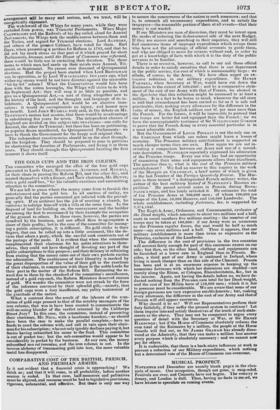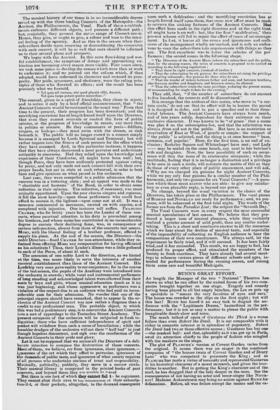MUSICAL PROSPECT.
NOVEBRISER and December are usually blank pages in the chro- nicle of music. Our occupation, though not gone, is suspsnded. Festivals are over, and Concerts have not begun. The country is dreary, and London is dull. Thus, having no facts to record, we have leisure to speculate on coming events.
The musical history. of our times is in no inconsiderable degree mixed up with the three leading Concerts of the Metropolis—the Ancient, the Philharmonic, the Vocal. Each of these establish- ments embraces different objects, and pursues a different path ; but; conjointly, they present the entire range of Concert-music. Hence, they give, or ought to give, a colour and tone to the musi- cal feeling of the wintry. And as this is the season when their subscribers decide upon renewing or discontinuing the connexion with each concert, it will be as well that ours should be iiiformed as to their several plans and prospects.
We begin with the Ancient. In this once flourishing and use- ful establishment, the symptoms of dotage and approaching ex- tinction are becoming every season more visible. Four rears since, we took some pains to develop the causes which were then at work to undermine it; ansr we pointed out the reform which, if then adopted, would have redeemed its character and restored its pros- perity. But pride, ignorance, and obstinacy, were the ruling prin- ciples Of those who directed its affairs; and the result has been precisely what we foretold.
Vet quia nil rectum, nisi quod placuit silbi, ducunt, Vel quia turpe putant parere minoribus
Tire counsel, given in a spirit of friendship, they chose to reject; and to notice it only by a brief official announcement, that "the Ancient Concerts would be continued in the usual way." From that time to the present, their progress has been downward; and the mortifying conviction has at length forced itself upon the Directors, that even they cannot overrule or control the force of public opinion, or the progress of knowledge in music, any more than in politics or science. Be. they commoners or peers—fiddlers, singers, or bishops—they must swim with the stream, or sink beneath it. The public will no longer crowd to a concert simply . because it is managed by Lords Spiritual and Temporal; but will rather inquire into the fitness of such persons for the office which they have assumed. And, in this particular instance, it happens that they have always discovered a most perverse and unfortunate antipathy to sinecures. Had they relied upon the knowledge and experience of their Conductor, all might have been well ; but, though Peers, they have here uniformly protested against voting by proxy, and not only made out each concert-bill with their own proper hands, but sat in state at each rehearsal, in order to beat time and give opinions on what passed in the orchestra.
• Last year, they were compelled to a public admission that the concern was in a tottering state ; and an appeal was made to the "charitable and humane" of the Band, in order to obtain some reduction in their salaries. The reduction, if necessary, was most unjustly apportioned. Upon the poor chorus-singers and repienos, it fell the most heavily—upon those performers who could best afford to. sustain it, the lightest—upon some not at all. It was a measure commenced in meanness, carried on with caprice, and completed with injustice. One instance will suffice. FRANCOIS CRAMER, who for thirty years has been the Leader of these con- certs, whose punctual attention to his duty is proverbial among his brethren, and whose name has contributed in no inconsiderable degree to sustain their declining fame, was, in consequence of serious indisposition, absent from three of the concerts last season. Moat, with the liberal feeling of a brother professor, offered to supply his place. At the end of the season, the Directors—the noble Directors—fined CRAMER, for non-attendance, while they re- frained from offering MORI any compensation for having officiated as his substitute ! Thus, their Leader's illness was a little godsend to each of the Peers, of about 4/. each.
. The accession of one noble Lord to the direction, as we hinted at the time, was. more likely to serve the interests of another musical _establishment. than those of the Ancient Concert. His Lordship very soon. gave reality to our conjecture; for in the course of the last season, the pupils of the Academy were introduced into the orchestra in-crowds; while.vocal and instrumental performers of long standing and acknowledged talent were elbowed from their seats by boys and girls, whose musical education (such as it is) was just beginning, and whose appearance as performers was a violation of the respect due to an audience who had paid no incon- siderable sum for their admission. No wonder that one of the principal singers should have remarked, that to appear in the or- chestra of the Ancient Concert was now rather a disgrace than a credit to any professional man. The probable object, to which this was but a preliminary step, is to convert the Ancient Concerts into.a.sort of appendage to the Tenterden Street Academy. The
present occupants -of the orchestra will be subjected to fresh in-
dignities.: those who have sufficient independence of spirit and pocket will withdraw from such a scene of humiliation ; while the humbler drudges of' the orchestra will eat their "half loaf" in just though hopeless discontent, and sigh over the recollection of the Ancient .Concerts in their pride and glory.
-Let it not.besupposed.that we accuse all the Directors of a deli- berate intention to compass the destruction of these concerts. MostOf them; we believe, err from ignorance, sheer ignorance,— ignorance of the art which they affect to patronize, ignorance of the demaads of public taste, and ignorance of what society requires of all persons who undertake stations of trust and responsibility. Musically, politically; publicly, they move in a narrow circle. Their musical library is comprized in the printed books of past concerts, and beyond these they are unable tn travel Bin there -is one fact Of which they cannot fail t i be cognizant. They cannot shut their eyes to toe itiomouttoit of their subscrip- tion-list, or their pockets, altogether, to the demand consequent upon such a .defitication : and the mortifying conviction has, at length forced itself upon them, that some new effort must be made to. retrieve the sinking fortunes of the Ancient Concerts. Had this effort been made in the right direction and at the right time, all might have been well : but, like the first" modification," their present scheme will fail to repair the effect of years of inismanage- ment. In fact, it. leaves all the errors and ignorances and omrs- sions of the management wholly untouched, and is only an endette • your to coax the subscribers into acquiescence with things as they are. The first expedient was to lower tile salaries of the per- farmers; the second comes in the following shape.
" Tlae Directors of the Ancient Music inform the subscribers and the public, that, for the ensuing season, the series of concerts is proposed to be carried oz. according to the following regulations : " That there be eight concerts, (instead of twelve.)
" That the subscription be six guineas for subscribers retaining the privilege of attending rehearsals ; five guineas for those who do not.
" That the tranfer of tickets between father and sons, and between brothers, also between mother and daughters, and between sisters, he allowed. " That the subscribers retain the same privilege, as during the present season, of recommending for single tickets for the evening."
They add, that, "if the number of subscribers do not amount to five hundred, the concerts will be discontinued."
It is strange that the authors-of this notice, who move ia "a cer- tain circle," do not see that its effect will be to hasten the period it is designed to defer, and to put a speedier end to their direc- torial labours. The Ancient Concerts have always been much, and of late years solely, dependent for their existence on their exclusive character. It was known to be "of grace" that a name was plac d on the subscription-list, and that the solicitation was: always from and not to the public. But here is no restriction or reservation of East or West, of gentle or simple : the support of " the public" is solicited, and the thing is at once become" base, common, and popular." Here, for the first time, is an end of ex- elusion; Berkeley Square and Whitechapel have met; and Lady. -- may be seated on the same bench, nay next to her butcher's wife and daughter. Now, the bare possibility of such an occur- rence will thin the room of its aristocratic occupants ; while the multitude, finding that it is no longer a distinction and a privilege to be seen in such a circle, will estimate the merits of this as they do those of every other place of public amusement, and will ask, "Why are we charged six guineas for eight Ancient Concerts, while we pay only four guineas for a similar number of the Phil- harmonic, and only two guineas for six Vocal Concerts ?"—A ques- tion which those must answer who are able : to give any satisfac- tory or even plausible reply, is beyond our power. No chancre, beyond the usual variation in the choice of the Directors, has taken place at the Philharmonic. The vocal pieces of BISHOP and NOVELL° are ready for performative; and, we pre- sume, will be rehearsed at the first trial night. The words of the former are from the Paradise Lost; the subject the "Seventh Day:-
The Vocal Concerts were in every respect the most successful musical speculations of last season. We believe that they pro- duced a larger 'sum of musical pleasure, while they certainly realized a greater amount of solid profit, than any similar under- taking. This is a short and conclusive answer to all the nonsense which we hear about the decline of musical taste, and especially of the impossibility of collecting an English audience to hear the-
compositions of their own countrymen. We always said, let the experiment be fairly tried, and it will succeed. It has been fairly tried, and it has succeeded. This result, we are happy to find, has
produced its proper effect, and stimulated the members of the Society to fresh exertions. They have already had several meet- ings to rehearse various pieces of different schools and.ages, in- tended for performance during the ensuing season, and among them some rare and beautiful Machigal.



















 Previous page
Previous page